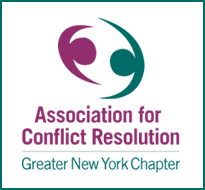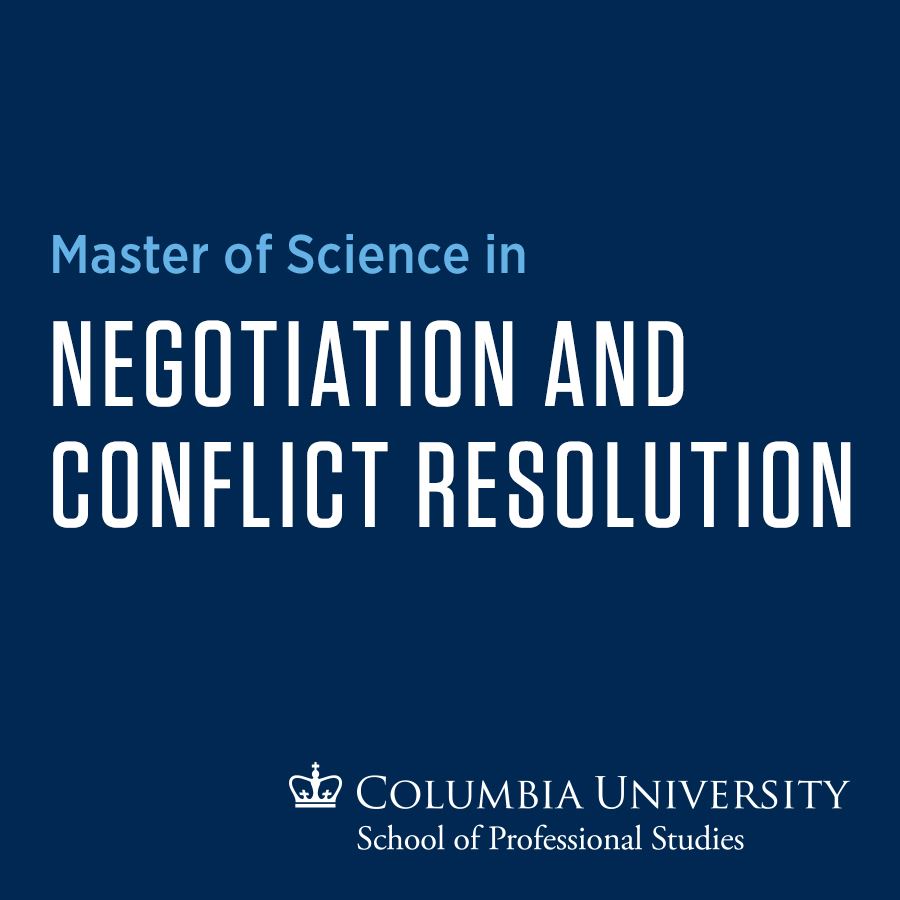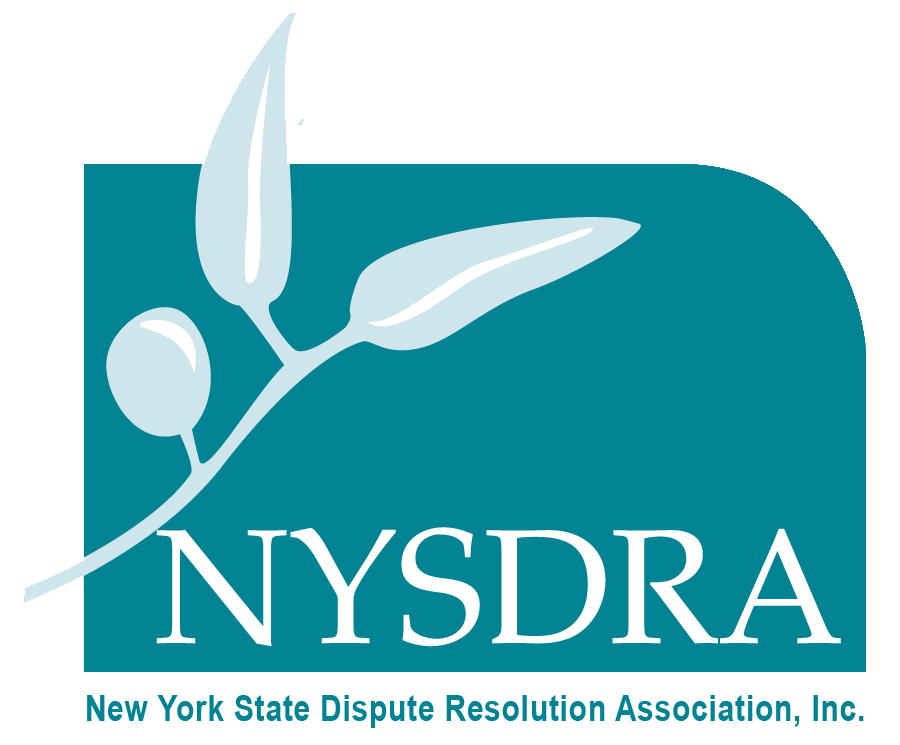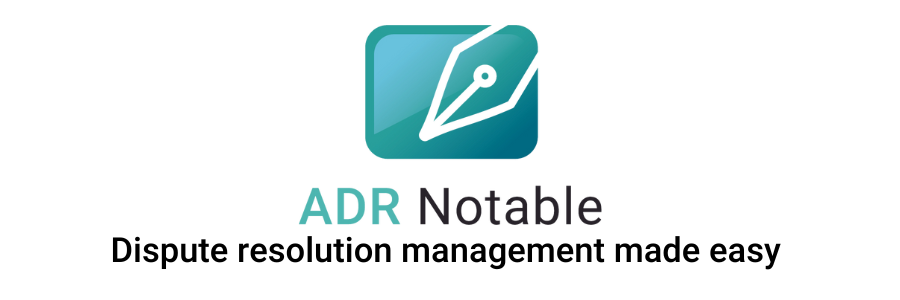|

| TIME | TUESDAY, MAY 30 |
| 9:00am |
Green Mediation Apprenticeship Programs: Exploring the Application of Sustainable Practices to Peacemaker Education (Presented by Courtney Chicvak) |
| 9:40am |
Resolving Eviction Cases - An Integrated Approach to Mediation (Presented by Seth Izen, Li Morrison) |
| 10:30am |
A Conversation with Honoree Special Envoy Jessica Stern (Moderated by ACR-GNY Board President Emily Skinner, PhD) This event has been postponed. Stay tuned for more information. |
| 11:45am |
Efficiency in Practice - The Implementation of Technology to Add Efficiency & Speed to Your Practice (Presented by Kristyn Carmichael) |
| 12:55pm |
R(evolutionary) Organizational Structures (Presented by Yura Sapi, Christiamilda Correa) |
| 2:20pm |
Overcoming Avoidance of Diversity Changes in Dispute Resolution: Tools for Change (Presented by Dan Berstein) |
| 3:00pm |
Toxic Culture, Retention and Third-Party Intervention (Presented by Ed Watt) |
|
BREAK |
|
| 6:00pm |
[IN-PERSON EVENT] Navigating Uncertain Futures at the Speed of Need (Panelists: Zaynab Abdi, Borislava Manojlovic, Shai Naides; Moderated by Nick Pozek) (Co-sponsored by CUNY Dispute Resolution Center at John Jay College and ACR-GNY) *Requires separate registration. Register and find more information here. |
Session tracks
• Commercial ADR (Business, Finance, Securities)
• Interpersonal (Family/Divorce, Restorative Justice, CDRC, Interfaith)
• Organizational/Governmental (Labor/Employment/Workplace, Schools, Co-op/Condo, Ombuds)
• Peacebuilding/CR Process (International, Societal, NGO, Large Scale)
• Dispute Prevention, Negotiation, and Other Resolution Skills
• Other
WELCOME VIDEO MESSAGE FROM ACR-GNY PRESIDENT EMILY SKINNER, PH.D.
SESSION #1 - 9:00am
Green Mediation Apprenticeship Programs: Exploring the Application of Sustainable Practices to Peacemaker Education
Presented by: Courtney Chicvak
As both responses to climate change and building conflict resolution capacity become urgent, time-sensitive issues in society, how can Community Dispute Resolution Centers (CDRCs) respond in a way that develops skilled mediators that deliver quality and inclusive mediation services while also advocating for environmentally conscious practices?
This presentation will outline the core principles of sustainable practices, detail the benefits of incorporating eco-friendly practices into apprenticeship programming, and describe strategies applied to mediation apprenticeship programs at CDRCs, using EAC Network Long Island Dispute Resolution Centers apprenticeship program as an example.
••
Resolving Eviction Cases - An Integrated Approach to Mediation
Presented by: Seth Izen, Li Morrison
Starting in November 2020, MetroWest Mediation began receiving eviction referrals from the District Court at the Case Management Conference. Recognizing that tenants and landlords needed help bridging communication, jointly applying for rental assistance, and connecting with other community resources, we expanded the role of our service to provide support more commonly associated with social work than mediation. Our goal was to do everything necessary to enable landlords and tenants to come to the mediation table as prepared as possible.
The success of this housing mediation program contributed to our home city, Framingham, having the lowest percentage of eviction orders as a percentage of overall Summary Process eviction filings of the 16 cities in Massachusetts of a comparable size.
This presentation will discuss the impact of our program as well as the challenges and opportunities from our expanded role in assisting landlords and tenants before they get to the mediation table. Questions to discuss include: How can we stay neutral while serving in a quasi-advocate or social work role? What does our organization gain from stepping outside of a traditional "mediator" role? Does the success of the program and benefit to community justify the risk of this untraditional focus?
We hope this presentation will help other mediation providers think critically about their role and how they can best assist parties in cases in which support may be needed prior to the mediation.
••
A CONVERSATION WITH SPECIAL ENVOY JESSICA STERN - 10:30am
This event has been postponed. Stay tuned for more information.
Appointed by President Biden, Jessica Stern serves as the Special Envoy to Advance the Human Rights of Lesbian, Gay, Bisexual, Transgender, Queer and Intersex (LGBTQI+) Persons. Special Envoy Stern leads U.S. efforts to protect LGBTQI+ persons globally from violence and discrimination.
Prior to joining the Department of State, Stern led Outright International, a global LGBTQI+ human rights organization, as its Executive Director for ten years. At Outright, Stern helped the organization secure observer status at the United Nations, release human rights reports annually, built the world’s largest COVID LGBTQI+ grant-making program, and quintupled the budget. Before Outright, Stern was a researcher and advocate at Human Rights Watch, Amnesty International, and the Center for Constitutional Rights.
Stern has a long history of multilateral engagement. She was a founding member of the UN LGBTI Core Group and of its secretariat. Stern successfully campaigned for the first UN General Assembly resolution to include gender identity and for successive Human Rights Council resolutions on sexual orientation and gender identity, leading to the establishment of the Independent Expert on Sexual Orientation and Gender Identity. Stern provided the first LGBTQI+ rights expert testimony in a UN Security Council Arria. Stern has frequently served as an advisor to UN mechanisms, including as a founding member of the UNWomen LGBTI Reference Group.
Stern is a published author, is frequently cited in the media, and is the recipient of numerous honors, including from Crain’s New York Business, Gay City News, and the Metropolitan Community Church. As an adjunct associate professor, Special Envoy Stern taught the first LGBTQI+ rights course at Columbia University’s School of International & Public Affairs. Special Envoy Stern has lived in Mexico, the United Kingdom, and Uruguay.
SESSION #3 - 11:45am
Efficiency in Practice - The Implementation of Technology to Add Efficiency and Speed to Your Practice
Presented by: Kristyn Carmichael
For many mediators, it is common to run their practice with limited technology and obsolete systems. As technology expands, so does the ability to track your clients, payments, and practice with ease. This includes the implementation of CRM systems that integrate with payment, calendaring, marketing, and more. This training covers the many options available to the ADR field to expand their practice, making it more efficient and removing administrative actions from the mediator's work load.
••• (Any ADR practice)
SESSION #4 - 12:55pm
R(evolutionary) Organizational Structures
Presented by: Yura Sapi, Christiamilda Correa
Are you tired of traditional organizational structures that leave some members feeling unheard and undervalued? Are you ready to create a truly liberated structure for your community group? Join us for an enlightening session on R(evolutionary) Organizational Structures.
As you look to create a more liberated structure for your community group, we offer a comprehensive exploration of biomimicry and nature as our teacher, welcoming feedback processes, and liberated decision-making strategies that prioritize collective liberation.
Through a combination of healing arts, writing, meditation, and visualization exercises, you will discover new ways of engaging with your community, working together, and sharing responsibilities. Our expert facilitators will guide you through the process of designing a truly liberated organizational structure for your group.
Join us to gain the knowledge and skills necessary to transform the way your community functions. Be a part of the movement towards a more equitable and just society.
•••• (Decolonizing, meditation, healing, art therapy)
Overcoming Avoidance of Diversity Changes in Dispute Resolution: Tools for Change
Presented by: Dan Berstein
The Mental Health Safe Project's advocacy has led to major updates to dispute resolution guidance so practitioners do not inadvertently discriminate against people with mental illnesses and disabilities (ex. discriminatory screening, illegal inquiries, or disparate treatment). Yet even dispute resolvers can be conflict-averse, and achieving these updates was sometimes challenging when people were reticent to engage. This workshop reviews research about six types of avoidance - big-tenting, isolating, abnormalizing, stonewalling, evading, and distracting - and applies them to real case studies of positive changes. Learn a method of honoring the avoider's self-determination while providing objective reflections of their boundaries, as well as clear next steps to move forward and make important diversity changes that transcend resistance. Receive tools designed to help avoiders and advocates alike de-escalate and forge peaceful progress.
•••••
SESSION #6 - 3:00pm
Toxic Culture, Retention and Third-Party Intervention
Presented by: Ed Watt
The Covid pandemic has precipitated the Great Resignation and pulled back the curtain to reveal a perfect storm. Many occupations, now considered essential, have borne the brunt of dysfunctional culture and physical and psychological stressors.
According to research, incivility, harassment, bullying, and other toxic interactions can result in absenteeism, presenteeism, turnover, and other behaviors that negatively affect an organization's core mission and bottom line.
Research on workplace turnover shows that dysfunctional culture can be invisible and ubiquitous. Curing dysfunctional interaction with a transformative approach to workplace culture is cost-effective, people-friendly, and the right thing to do.
Culture change has been mentioned in workforce literature for twenty or more years. However, the ability to implement that change has been elusive. Addressing dignity in the workplace may be the missing element in the search for workforce retention tools. We look at third-party intervention in the US Postal System and the National Institutes of Health as examples of culture-reforming systems. Instituting a conflict resolution system that recognizes and honors the individual's dignity and agency will improve employee retention and performance and have collateral benefits in areas such as customer service. Adopting a program of transformative mediation is the next step in the evolution of conflict interaction.
•
IN-PERSON EVENT AT JOHN JAY COLLEGE - 6:00pm
Navigating Uncertain Futures at the Speed of Need: A Conversation
Location: John Jay College of Criminal Justice
(899 Tenth Avenue, New York, NY - Haaren Hall, Room 630)
Join us at John Jay College of Criminal Justice for Navigating Uncertain Futures at the Speed of Need, featuring special guests Zaynab Abdi, Borislava Manojlovic, and Shai Naides and moderated by Nick Pozek. This is an opportunity to reconnect with colleagues from ACR-GNY and the Roundtable Breakfasts in an evening event!
This discussion considers the polycrisis - the convergence of seemingly intractable and potentially existential risks defining the 21st century. Through topics such as the myriad of humanitarian crises, the rise of AI, the climate emergency, and deepening political polarization, this conversation will explore the emerging issues that conflict resolvers face today and the competencies needed to address them.
We are looking forward to an evening of conversation and connection. Light refreshments will be served. We hope you will join us!
*This event requires separate registration. Please register here!*
CO-SPONSORED BY:
CUNY Dispute Resolution Center at John Jay College
Association for Conflict Resolution - Greater New York Chapter (ACR-GNY)




